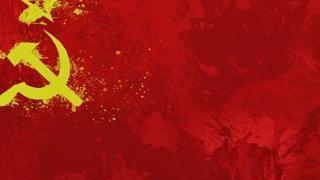Anti-Communism And Anti-Fascism Are Tools Of Capitalism
Primary tabs

These notes below correlate to a broader Russian language-only discourse on Dr. Dugin’s ‘Dugin’s Directive’ show, intended for Russian audiences. The results can lead to some confusion among Anglophone readers as well as those following events in Ukraine. For the record, Dr. Dugin has been a staunch advocate and supporter of self-described socialist countries led by communist parties throughout the world today, as well as national-liberation and anti-imperialist nationalist states, consistently and without exception. At the same time, he has been absolutely opposed to the self-described, armed fascist and neo-nazi movements which actually threaten – and indeed have killed – many innocent people in the Ukraine. Indeed for this advocacy, he was severely censured. Additionally, he has been a staunch supporter of people’s movements in the 1st world which the liberal-operationalized-left, mainstream media, and liberal-controlled academia terms ‘Alt-right’ and have in a defamatory fashion termed ‘neo-fascist’. What is clear in the below is that Dugin is talking about is how anti-communism and anti-fascism are memetically operationlized in 1st world, liberal (i.e capitalist) societies, where these take on the spectre of a divide-and-conquer strategy. Dugin is neither a communist, liberal, or fascist, but rather looks at how and why the coming and unfolding next political theory is taking form. Much of his work has been a proposal on what that next political theory will take shape as. – J. Flores
*
By Dr. Alexandr Dugin
· In the post-Soviet period, communism went through several stages in our society. First, after the fall of the USSR, there were Marxist circles that still had inertia, which did not surrender, believing that the catastrophe was temporary. In this passive attitude, an indecisive and conformist nostalgia became a form of suicide and led to their disappearance. There were also radical communists in the 90’s who tried to get together – among them were passionate people who were not significant during the USSR itself, but in the 90’s they turned out to be honest people with integrity – but gradually they also ceased to really be. For a while in Russia, we were without communists.
· But recently, new leftist groups began to form – most often they had no relation to the USSR, that is to say they were communists but not by Soviet inertia, but as a result of their own reasons.
· Communism represented the binary system of a serious geopolitical actor — the USSR, plus communist China and other socialist countries. Communism was in opposition to capitalism, and this opposition was confirmed by power, diplomacy and territory. But in 1991, everything collapsed.
· This led to a fundamental change in the status of the left — if before 1991 a communist could rely on the geopolitical potential of the USSR, then after 1991 communism turned into a certain tendency, a social movement that had lost its power component. It has become a loose and less understandable phenomenon. Historically, the end of the USSR was the end of a bipolar ideological struggle.
· After 1991, they are often used as a condiment for dishes prepared by liberals to resist national rebirth. The same function as the fascists after 1945, who became an instrument of a liberal strategy. The fascists are attacking the “communists”, or support separatism in individual countries. The Communists gained importance from the liberals to fight the “fascists.” Today, speaking of the struggle of the communists against the fascists, we are talking about the strategy of the liberals, who use them in their memocentric plans.
· Danger to humanity is Liberalism*. It is the enemy of the left and the right – and if the left and the right are fighting liberalism, they can be truly left or right. If anti-fascism becomes the main thing for the left, and anti-communism is the main thing for the right, then we are dealing with the tools of the system. These are spectacles of simulacra working for Soros.
· Liberalism rules today. We must understand that this is our enemy, and as long as it is not crushed, it is the object of our common struggle.
*the ideology of capitalism under conditions of late and post modernity
